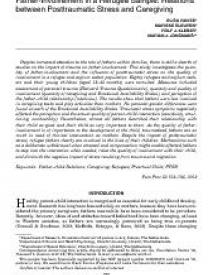Father‐Involvement in a Refugee Sample: Relations between Posttraumatic Stress and Caregiving
Despite increased attention to the role of fathers within families, there is still a dearth of studies on the impact of trauma on father-involvement. This study investigates the quantity of father-involvement and the influence of posttraumatic stress on the quality of involvement in a refugee and asylum seeker population. Eighty refugees and asylum seekers and their young children (aged 18–42 months) were recruited. Measures included assessment of parental trauma (Harvard Trauma Questionnaire), quantity and quality of involvement (quantity of caregiving and Emotional Availability Scales), and perception of the father–child relationship (interview). The results show that fathers were less involved in caregiving tasks and play activities than mothers. No parental gender differences were found on each of the Emotional Availability Scales. Traumatic stress symptoms negatively affected the perception and the actual quality of parent–child interaction (sensitivity, structuring, nonhostility). Nevertheless, almost all fathers described their relationship with their child as good and their child as very important to them. As the quality of father-involvement is of importance to the development of the child, traumatized fathers are as much in need of clinical intervention as mothers. Despite the impact of posttraumatic stress, refugee fathers clearly are involved in the lives of their children. Mechanisms such as a deliberate withdrawal when stressed and compensation might enable affected fathers to step into the interaction when needed, raise the quality of involvement with their child, and diminish the negative impact of stress resulting from trauma and migration
Geachte bezoeker,
De informatie die u nu opvraagt, kan door psychotraumanet niet aan u worden getoond. Dit kan verschillende redenen hebben,
waarvan (bescherming van het) auteursrecht de meeste voorkomende is. Wanneer het mogelijk is om u door te verwijzen naar de bron
van deze informatie, dan ziet u hier onder een link naar die plek.
Als er geen link staat, kunt u contact opnemen met de bibliotheek,
die u verder op weg kan helpen.
Met vriendelijke groet,
Het psychotraumanet-team.
Reference:
E. van Ee, M. Sleijpen, R.J. Kleber, & M.J. Jongmans, | 2013
In: Family Process, ISSN 0014-7370 | 52 | 4 | december | 723–735
http://onlinelibrary.wiley.com/doi/10.1111/famp.12045/full
In: Family Process, ISSN 0014-7370 | 52 | 4 | december | 723–735
http://onlinelibrary.wiley.com/doi/10.1111/famp.12045/full


